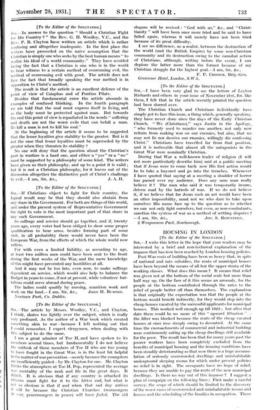[To the Editor of the SPECTATOR.] SIR,—The article by Messrs.
Woolley, V.C., and Clayton, I think, skates too lightly over the subject, which is really very profound. As the author of a War book which created something akin to war—because I left nothing out that I could remember, I expect clergymen, when dealing with this subject to do the same.
I am a great admirer of Toe H, and have spoken to its members several times, but fundamentally I do not believe the outlook of those members of Toc H who are too young to have fought in the Great War, is in the least bit helpful in the matter of war prevention—merely because the youngsters are insufficiently guided—by Mr. Clayton for one. Mr. Clayton thinks the atmosphere at Toc H, Pop, represented the average war mentality of the rank and file in the great days. It didn't. It is obvious that if any country is attacked its Citizens 'mist fight for it to the bitter end, but what is not so obvious is that if and when that sad day arrives it will be ° because the Christian Churches (warmongers in war, peacemongers in peace) will have failed. The old slogans will be revived : "God with us," &c., and " Christ- tianity " will have been once more tried and be said to have failed again, whereas it will merely have not been tried because of its great difficulty.
I see no difference, as a realist, between the destruction of the world (and the British Empire) by some non-Christian community and its destruction owing to the cannibal action of Christians, although, writing before the event, I can deplore the latter more than the former because of my Christian struggle for the highest goal.—I am, Sir, &c.,






































 Previous page
Previous page